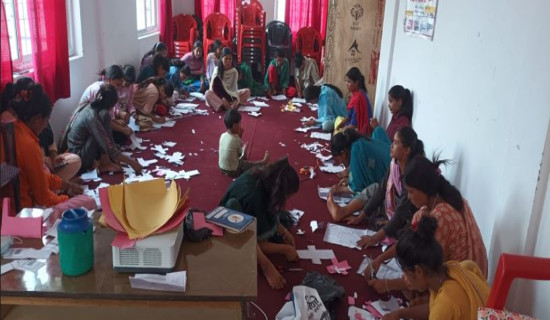- Thursday, 25 April 2024
For Fair Global Order
Driven by the digital technology and economic globalisation, the world has increasingly become interdependent. Despite different cultures, nationalities, ecology and socio-political systems, the nations have deepened their interactions and relations to their harmonious coexistence and mutual wellbeing.
They exercise their distinct territorial and political sovereignty but at the same time they are beset with common problems such as climate change, pandemic, poverty, ethnic conflict, wars, cybercrimes and inter-state migration. It is only with mutual collaboration, understanding and cooperation that they can resolve these vexing issues. In order to maintain global peace and sort out conflict between the nations, various treaties, agreements and legal mechanisms have been developed over the years. The creation of the United Nations, its Charter and associated agencies is considered to be a big step towards solving the problems of international scale and scope.
The UN and its members have been involved in formulating international laws to sort out disputes related to territory, trade, and violation of economic, social and cultural rights of people. The international laws are necessary to ensure justice to vulnerable people and nations. The international law provisions consist of rules, norms and ethical guidelines which are binding for the nations.
These laws and standards help them pursue predictable and consistent international relations. The countries which are a party to such treaties and covenants must abide by them. If the powerful nations give a short shrift to the international treaties and agreements, the poor countries and those vulnerable to global warming and victimised by unintended conflict are left in the lurch.
Against this backdrop, President Bidya Devi Bhandari has called for adequate international laws to address the interests of mountainous and island nations. She made this remark at the Asian regional conference on International Law organised in Kathmandu the other day. It is true that existing international laws have failed to address the specific needs of mountain people who live in fragile landscapes that support over 10 per cent of earth's population and preserve the watersheds that provide freshwater to more than half of the humanity.
But the communities residing in these mountains have been pushed to poverty as the climate change has constantly threatened their sources of livelihoods. Rise in temperature has led to snow melt, glacial retreat and formation of glacial lakes that pose threat of bursting and causing flash floods in the downstream settlements. In addition, excessive rains, droughts, drying up of water sources and loss of biodiversity have been increasing due to rising temperatures and changing climate.
In another context, President Bhandari noted that Nepal has been strongly advocating for non-aligned foreign policy for the protection of its sovereignty and national integrity. As a committed member of the UN, Nepal has followed the policy of peaceful co-existence, sense of fraternity, non-aggression, and non-interference in compliance to international law. It has always sought peaceful means to resolve disputes between countries. As a Least Developed Country (LDC) and mountainous nation, Nepal has advocated the right to transportation and transit for all landlocked countries and taken initiatives to ensure its access to the sea.
The international laws should be geared towards ensuring rule-based order and justice. The conference should contribute to frame such laws according to specialised historic experiences, context and dimensions of international relations and geography of nations. They should envision credible institutions and mechanisms aimed at peace, development and fair international order.

















